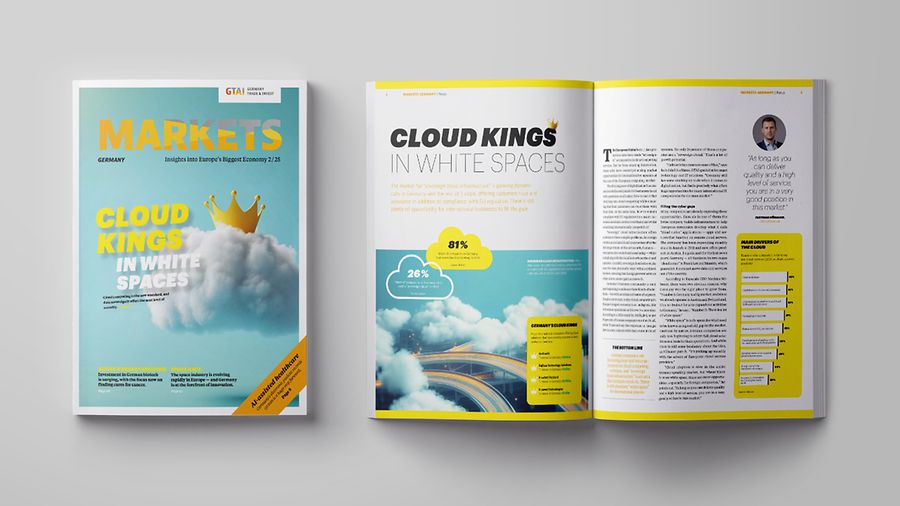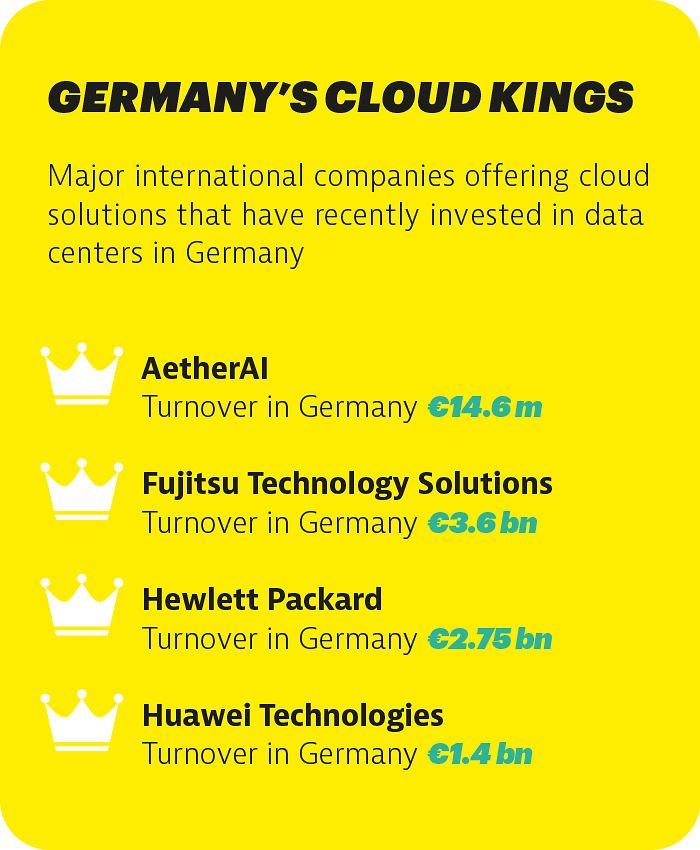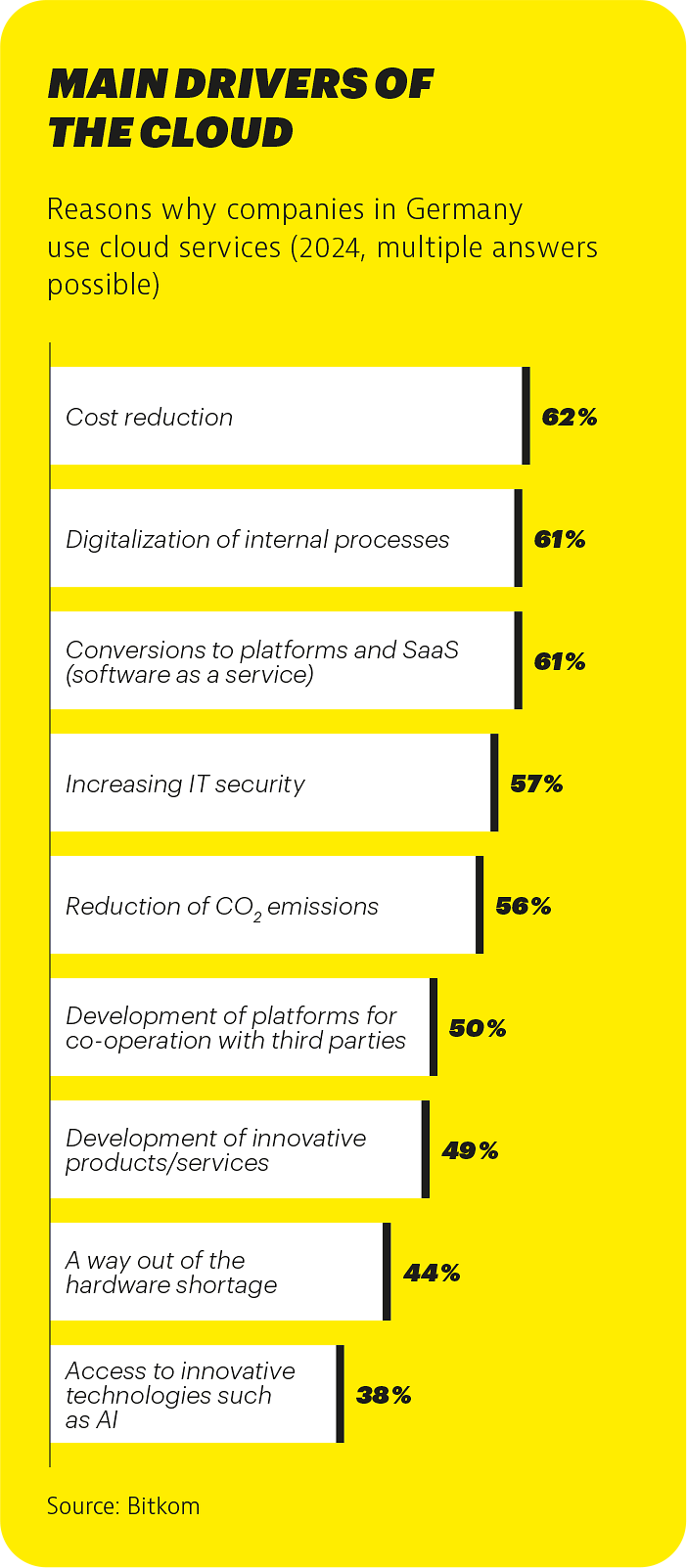Markets Germany Magazine 2/25 | Sovereign Cloud Infrastructure
Cloud Kings in White Spaces
The market for “sovereign cloud infrastructure” is growing dynamically in Germany and the rest of Europe, offering customers trust and assurance in addition to compliance with EU regulation. There is still plenty of opportunity for international businesses to fill the gaps.
Aug 07, 2025
The European Union’s strict data protection rules have made “sovereignty” an imperative in cloud computing services. But far from stunting innovation, these rules have created promising market opportunities for international companies at the core of the European computing market.
The dizzying pace of digitalization has created a multifaceted puzzle for businesses faced with questions on all sides: How to make that vital leap into cloud computing while ensuring that their customers can trust them with their data. At the same time, how to remain compliant with EU regulation (to ensure customers maintain control over that data) while remaining internationally competitive?
“Sovereign” cloud infrastructure offers solutions to these complex problems. Sovereign entities are isolated cloud systems that offer the full range of state-of-the-art security features — encryption, key control and monitoring — while complying with the local laws where the cloud operates. Crucially, sovereign clouds also make sure the data physically stays within defined borders, ensuring that foreign governments or other actors cannot gain access to it.
Germany’s business community is only just beginning to embrace these kinds of solutions — but with an enhanced sense of urgency. Despite a slow start, today cloud computing in Europe’s largest economy is as indispensable to business operations as it is everywhere else. According to a 2024 study by A1 Digital, some 84 percent of German companies use the cloud, while 70 percent say that exposure to foreign laws is a key concern with their current cloud systems. Yet only 26 percent of those companies use a “sovereign cloud.” That’s a lot of growth potential.
“Culture is in a constant state of flux,” says Isabel da Silva Matos, GTAI specialist for smart technology and IT solutions. “Germany still has some catching up to do when it comes to digitalization, but that is precisely what offers huge opportunities for many international IT companies in the German market.”

This article was published in issue 2-2025 of the Markets Germany Magazine. Read more articles of this issue here
Filling the cyber gaps
Many companies are already exploring those opportunities. Exoscale is one of them: the Swiss company builds infrastructure to help European companies develop what it calls “cloud native” applications — apps and services that function on remote cloud servers. The company has been expanding steadily since its launch in 2011 and now offers products in Austria, Bulgaria and (for the last seven years) Germany — all thanks to its two major “cloud zones” in Frankfurt and Munich, which guarantee it does not move data and services out of the country.
According to Exoscale CEO Mathias Nöbauer, there were two obvious reasons why Germany was the right place to grow from. “Number 1: Germany is a big market, and since we already operate in Austria and Switzerland, it’s a no-brainer for us to expand our activities to Germany,” he says. “Number 2: There is a lot of white space.”
“White space” is tech-speak for what used to be known as a good old gap in the market. Cautious by nature, German companies are only now beginning to adopt full cloud solutions as a basis for their operations. And while there is still some hesitancy about the idea, as Nöbauer puts it, “it’s picking up steadily with the advent of European cloud service providers.”
“Cloud adoption is slow in the entire German-speaking market, but where there is more white space, there are more opportunities, especially for foreign companies,” he points out. “As long as you can deliver quality and a high level of service, you are in a very good position in this market.”
The Bottom Line
German companies are becoming more and more dependent on cloud computing solutions, and “sovereign cloud infrastructure” is an area that Germany excels in. There is still abundant “white space” for international players.
Nice or need to have?
To provide a “high level of service” in Germany these days means not only data privacy and compliance with European legislation but also independence from US and Chinese clouds.
In years gone by, a sovereign cloud resource might have been filed under “nice to have” rather than “need to have.” It was not absolutely necessary for maintaining a competitive edge. After all, in a globalized world of free trade, countries are potential partners rather than competitors — so does it really matter where your cloud is? Now, with the geopolitical situation rapidly shifting toward protectionism, sovereign clouds are becoming more important than ever.
When Exoscale was starting out, recalls Nöbauer, Europe simply didn’t have enough cloud providers. “At the time, about ten years ago, there were basically only US cloud providers, like Amazon and Microsoft, and maybe one or two Chinese competitors.” Since then, the market has become much more diverse, and European contenders can now compete with their rivals in both price and performance. “The huge difference is that as a European company we can fully comply with European legislation and regulations,” said Nöbauer. “This has become an even more decisive factor for our customers.” Exoscale is not covered by the US CLOUD Act, and while it caters to companies of all sizes, it has found that its product is particularly appealing to public sector industries like healthcare. Nöbauer has registered an increasing interest by the German government in sovereign clouds because it is so important that data stays inside the country. “I would say the number and size of those opportunities are increasing,” he says.
FDI Perspective: NTT DATA IN DACH
Japanese company NTT DATA has been providing IT solutions in Germany since 2012 and offers businesses in the whole DACH region a unique range of sovereign services, from data centers to AI models.
But only recently has the company’s focus on offering independent infrastructure turned a theoretical benefit into a tangible one. “Current geopolitical developments show that this has now developed into a practical advantage,” says NTT DATA CTO Oliver Köth. “It is also clear that many major investment projects in the near future will have a distinctly regional, i.e. European, character.”
Indeed, in the area of industrial data exchange, there is a particular need to create European data spaces that comply with EU regulation and privacy requirements as well as allowing independence from US providers. “Germany is one of the leading economies worldwide and it is foreseeable that major investments are planned,” says Köth. “For these investments to reach their full potential, they need a solid IT infrastructure. NTT DATA is the ideal partner for this.”
countries of operation : 50+
employees worldwide: 15,000+
turnover in 2023/2024: €1.61 bn
European values around the world
Europe has established its own sovereign cloud infrastructure through initiatives like Gaia-X, a federated system linking cloud service providers and users that’s designed to drive the burgeoning European data economy. But it is not aimed at European companies alone. Gaia-X was founded in Brussels in 2021 — in part thanks to an initiative of the German Ministry for Economic Affairs and Climate Action — and while its original members were 22 French and German organizations, including multinationals like Siemens and BMW, the network now has more than 250 members from all over the world.
“Gaia-X provides spaces to define rules and manage data based on European values, rather than another company’s rules,” says Gaia-X CEO Ulrich Ahle. “The cloud services market is dominated by non-European companies, the so-called hyper-scalers, which have their own rules. We are becoming more and more aware that our businesses, as well as our private lives, will gravitate more and more around data,” Ahle adds. “Data is becoming more and more valuable, and we provide an instrument not only to share data, but also for creators to benefit from its value.”
Successive German governments have shown a commitment to investing in the creation of free and safe “data spaces” like those Gaia-X provides. These spaces allow companies to share data with their suppliers around the world, making data management much more efficient. Gaia-X is useful both for companies with domestic user bases — like public sector companies that need to ringfence data — as well as multinationals that serve global markets. “For them it is of the utmost importance that the data is available on the global scale,” says CEO Ulrich Ahle. To address demand, Gaia-X has now begun creating data hubs outside Europe, for example in South Korea. “It is important that we win organizations outside Europe to support the creation of data spaces based on a federated cloud infrastructure,” Ahle explains. “We are also able to implement rules based on non-European legislation.”
For businesses everywhere, the benefits of cloud computing are clear. It offers agility, cost savings and future proofing. But in a rapidly changing world, only sovereign clouds offer total assurance.



